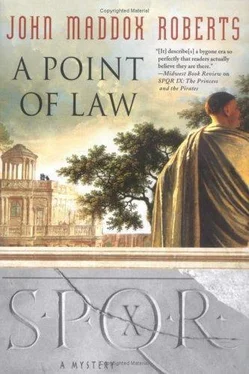John Roberts - A Point of Law
Здесь есть возможность читать онлайн «John Roberts - A Point of Law» весь текст электронной книги совершенно бесплатно (целиком полную версию без сокращений). В некоторых случаях можно слушать аудио, скачать через торрент в формате fb2 и присутствует краткое содержание. Год выпуска: 0101, ISBN: 0101, Издательство: St. Martin, Жанр: Исторический детектив, на английском языке. Описание произведения, (предисловие) а так же отзывы посетителей доступны на портале библиотеки ЛибКат.
- Название:A Point of Law
- Автор:
- Издательство:St. Martin
- Жанр:
- Год:0101
- ISBN:9780312337254
- Рейтинг книги:5 / 5. Голосов: 1
-
Избранное:Добавить в избранное
- Отзывы:
-
Ваша оценка:
- 100
- 1
- 2
- 3
- 4
- 5
A Point of Law: краткое содержание, описание и аннотация
Предлагаем к чтению аннотацию, описание, краткое содержание или предисловие (зависит от того, что написал сам автор книги «A Point of Law»). Если вы не нашли необходимую информацию о книге — напишите в комментариях, мы постараемся отыскать её.
A Point of Law — читать онлайн бесплатно полную книгу (весь текст) целиком
Ниже представлен текст книги, разбитый по страницам. Система сохранения места последней прочитанной страницы, позволяет с удобством читать онлайн бесплатно книгу «A Point of Law», без необходимости каждый раз заново искать на чём Вы остановились. Поставьте закладку, и сможете в любой момент перейти на страницу, на которой закончили чтение.
Интервал:
Закладка:
“Oh, come now, Decius. Nothing is beneath the dignity of Egyptian royalty, everyone knows that.”
I glanced at the angle of the sun. It was just past midafternoon. The old sundial we looted from Syracuse two hundred years before would show the hour to be the sixth, possibly the seventh. It always gave the time incorrectly, but it would be somewhere in that region.
“Sallustius, I am sure that this is taking us someplace, but I can’t imagine where.”
“I would truly love to have your personal account of Catilina’s conspiracy. I believe you know things nobody else does.”
“You’ve asked me about it often enough.”
“Suppose I had something to trade? Something of great interest to you right now? Something of vital importance to your career and possibly to your continued existence? Might that not be worth your helpful cooperation?”
I considered this. It did not come unexpectedly. Collecting secrets was the breath of life to Sallustius. Trading them was his passion. He would not make such a proposition idly. I knew he must truly believe he had something worth my granting him an interview about that unhappy experience. He knew the value of information the way a slave trader knew the value of his human livestock.
“All right,” I said after due consideration. “If you truly know something I don’t know already, you shall have your interview. But it will have to be after this business is settled and the elections are over.”
“That is understood,” he said, nodding and grinning like an ape. “You’ll have a few days between the election and the day you assume office.” Like everyone else, he knew that, barring death or conviction, I would be elected praetor.
“Done. What do you know?”
“Let’s find a quiet place to talk.”
We left the steps of the balnea and passed between the two temples into the Forum. A short walk brought us to the Temple of Saturn. On this day and at this hour it was deserted except for its slaves, who were busy decorating it for the upcoming Saturnalia celebrations. The archaic, blackened image of the god, holding his golden sickle, his legs wrapped in woolen bands, ignored us as we entered the dimness of his home.
“This is where it started, by the way,” I said.
“What started?”
“My involvement in Catilina’s conspiracy.”
“In the Temple of Saturn? But of course,” Sallustius said. “You were Treasury quaestor that year. How could I have forgotten?”
“That’s for later. What do you have for me?”
We walked past the ornate podium that held military standards. In some years they stood like a dense forest, topped with eagles, boars, bears, spread hands, and other emblems of military units great and small. That year it consisted mainly of empty sockets. So many units had been activated that the only standards left were those of obsolete organizations, the phalanxes and maniples of previous centuries. One section had been covered with a black cloth. There had stood the eagles lost by Crassus at Carrhae. The cloth would remain, an emblem of dishonor, until the eagles were taken back from the Parthians.
Beyond this podium was a broad, marble desk used by the Treasury quaestors and their staffs on days of official business. Ranged around it were wooden chairs with wicker seats. We pulled out two chairs and sat, alone in the quiet dimness of the old temple. Only faint sounds of activity made their way through the open doors.
Sallustius arranged his toga, took his time getting comfortable, laced his fingers over his small but distinguished paunch, and began. “Does it ever strike you, Decius, how few the great families have become?”
“This is oblique, even for you. Get to the point.”
“Bear with me. I am a historian, and I take a long view of things. Like most of your class, you are a man of direct action and only take heed of what lies directly in front of you at the moment. You pay little attention to what stretches far behind and of what lies ahead.”
I sighed. This was going to take awhile. “I may be more perceptive than you think, but tell it as you like.”
“The great old patrician families, the Cornelii, the Fabii, and such, have been dying out generation by generation. They are infertile. More and more they rely on adoption. Or else they fall into poverty because patricians are barred from trade and business. Their only legitimate sources of income come from the land, which is no longer adequate. Public office is expensive, as you know all too well. The Senate takes its new members mainly from the wealthy equites now,” Sallustius began.
“You’re not telling me anything I don’t know.”
“Of course not. Everybody knows this. They just don’t take the trouble to extrapolate the consequences. Rome is a Republic, Decius, but it is far from being a democracy. Roman voters are profoundly conservative, and for centuries they have elected their leaders from a tiny clique of families. New Men like Cicero can be discounted. They have been too few to matter.
“The resulting order has been rough but relatively stable. There have been challenges-such as the upheaval of the Gracchi, the rebellion of Sertorius, Catilina’s abortive coup-but overall the order of things has been stable. But that order has been upset over the last three generations by a succession of military strongmen: Marius, Sulla, Pompey, and now Caesar have arisen to upset the order of things.
“It is our own fault, of course. We give our generals godlike powers within their theaters of war and their provinces. Then we expect them to come meekly home and behave like Republican statesmen. It is human nature to love power once one has tasted it, and few have tasted of power as deeply as Caesar or Pompey. Men hate to give power back to whoever bestowed it. They want to keep it for life, and they want to pass it on to their sons as if it were any other inheritance.
“Marius was a jumped-up peasant, he died mad and his children amounted to nothing. Sulla produced twin children late in life. He was old and dying and he knew it. He could have no important part in the upbringing of his son so he reluctantly but sensibly retired to private life after years of absolute power.”
“Considering Sulla’s proclivities,” I said, “it’s remarkable he produced any heirs at all.”
Sallustius shrugged off this non sequitur. “Pompey is another man of no family. His father came from nothing, and his sons are of no consequence. He has had a remarkable career, but it’s over, and he has no future did he but know it.
“Caesar is the man of the hour. His family is incredibly ancient-all the way back to Aeneas and the goddess Venus, if you care to believe his propaganda, but still the most ancient of all Roman families by any interpretation. He is a patrician, one of the few left in Roman politics. He is immensely popular with the commons. He is the most astoundingly successful general since Scipio Africanus. He is now rich beyond imagining. How old is Caius Julius?”
The sudden question took me a little aback. “About fifty, I think.”
“Exactly. Julius Caesar is fifty years old, and he has no heir. He has-what? — ten, perhaps fifteen vigorous years left to him? He has attained the years where men begin aging fast. If Calpurnia were to present him with a son tomorrow-a great unlikelihood since she is here in Rome, not pregnant, and he is in Gaul-he might live to see the boy perform his manhood ceremony, perhaps see him off to his first military tribuneship. He will never live long enough to guide a son’s career to the higher realms of imperium.”
I shifted uncomfortably in my wicker-bottomed chair. “What’s all this talk of heirs have to do with anything? Only monarchs need to worry about passing their powers on to heirs.”
Читать дальшеИнтервал:
Закладка:
Похожие книги на «A Point of Law»
Представляем Вашему вниманию похожие книги на «A Point of Law» списком для выбора. Мы отобрали схожую по названию и смыслу литературу в надежде предоставить читателям больше вариантов отыскать новые, интересные, ещё непрочитанные произведения.
Обсуждение, отзывы о книге «A Point of Law» и просто собственные мнения читателей. Оставьте ваши комментарии, напишите, что Вы думаете о произведении, его смысле или главных героях. Укажите что конкретно понравилось, а что нет, и почему Вы так считаете.









